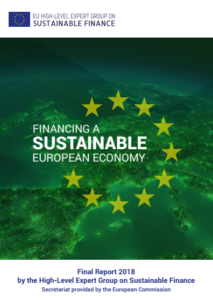January Insight – Why EU companies should embrace integrated reporting
 In this issue of Insight, Eurosif takes stock of the latest developments in integrated reporting and talks to Richard Howitt, the new CEO of the IIRC, former EMEP, and special rapporteur for CSR. The sustainable and responsible investment movement in Europe and worldwide has always encompassed the twin aims of developing the SRI market, and advocating for change in investment dynamics to integrate SRI principles amongst mainstream investors.
In this issue of Insight, Eurosif takes stock of the latest developments in integrated reporting and talks to Richard Howitt, the new CEO of the IIRC, former EMEP, and special rapporteur for CSR. The sustainable and responsible investment movement in Europe and worldwide has always encompassed the twin aims of developing the SRI market, and advocating for change in investment dynamics to integrate SRI principles amongst mainstream investors.
It is why Eurosif has long advocated the concept of integrated reporting by businesses and developed a natural partnership with its global champion: the International Integrated Reporting Council (IIRC). Launched in 2010, 1,600 global companies have already adopted integrated reporting, with its emphasis on broader, long-term value creation for business and investors.
Major global investors who helped forge or who have endorsed integrated reporting include BlackRock and Rockefeller in the United States, APG, NN Investment and PGGM in the Netherlands, Aviva, Aberdeen Standard and Hermes in the United Kingdom, Deutsche Asset Management, DWS and Aqal in Germany, Skandinaviska in Sweden, Natixis and Groupama in France, as well as state pension funds in South Africa, Japan and Australia. The association of European Financial Analysts Societies (EFFAS) is one of the key members of the IIRC’s global council.
Eurosif: Richard, it's been almost a year since you joined the IIRC. What have been some the main challenges that motivated you in this role?
Richard Howitt: Today there is widespread recognition that issues of inclusive and sustainable development - issues that include but also go beyond the figures – are material. They matter and for a multitude of reasons.
They matter because they have a financial impact. They matter because of the effect they have on the long-term viability of the business. They matter because of the impact they have on risks and opportunities. They matter because businesses and investors increasingly understand the necessity of being a part of society – not apart from society.
But behaviours that have become engrained in our businesses, our investors and our markets over many years are difficult to shift. Just because investors recognize the importance of looking beyond the financial report, it doesn’t make it easy to know how to take this into account, which questions they should be asking, which signs they should be looking for and how they can turn this into real decisions about capital allocation? These are some of the yet unanswered questions that are at the heart of what Integrated Reporting stands for and that shape the dynamics of the organisation today and for some time to come.
 That’s why Eurosif and the IIRC are working hand-in-hand to promote integrated reporting across Europe.
That’s why Eurosif and the IIRC are working hand-in-hand to promote integrated reporting across Europe.
Eurosif: Would you say we are now being confronted with a paradigm shift?
RH: Our aim is both to foster individual take-up of integrated reporting by businesses and investors, but also to exert policy influence to ensure the principles of integrated reporting and thinking, are built into capital market reform.
At the individual level, the International Integrated Reporting <IR> Framework, is already being practised by businesses and investors in twenty of the EU member states.
Together we helped shape the discussion which led to agreement of the European Union’s Non-Financial Reporting (NFR) Directive, and now want to appeal to a ‘core’ of businesses in every EU member state to implement the directive using the integrated reporting framework.
Eurosif: As a former European MEP, what are your views on the role of regulation in this respect?
RH: We have come a long way and this is the first time EU companies have been mandated to publish non-financial information, and with 6,000 companies across Europe changing their reporting practise this year to do so, it is a huge opportunity it’s to advance the integrated reporting approach.
The European Commission’s guidelines on implementing the directive reflect the principles of integrated reporting by encouraging businesses to adapt their existing reporting to reflect the broader, long-term vision for their company and the resources and relationships which they are using. The international <IR> Framework is cited as complying with the directive’s requirements.
A debate in the German parliament, the Bundestag, specifically highlighted that integrated reporting could be used to implement the directive, whilst Italian insurance company Unipol has become the first of what we hope will be many companies in Europe to produce an integrated report, stating that it already fully complies with the directive.
But real behavioural changes in our markets, does require changes in the ways in which those markets are structured and organised.
Eurosif: Integrated reporting is an important pillar for guaranteeing fundamental analysis for SRI and Eurosif members have long realised this. In that respect, the collaboration of our organisations is pivotal to guaranteeing further alignment.
RH: And that’s why the cooperation between EUROSIF and the IIRC also includes furthering our joint vision to support efforts towards a transition to a sustainable financial system - in Europe and the world.
That collaboration is currently focusing on the work of the influential EU High-Level Expert Group on Sustainable Finance, established by the European Commission.
The group’s Interim Report cites integrated reporting as being central to capital markets reform, calling it ‘the ultimate ambition’.
We will continue to work together to ensure the advancement of integrated reporting remains central to the group’s work and its essential follow-on by the European Commission itself.
The IIRC has never suggested that it can provide all the answers in the transition to an equitable and sustainable economy, but both of our organisations are clear that it is an indispensable tool in order to do so.
Our focus on the role of the investor and that global challenges are ones which have real financial impact in the long-term, are at the heart of that conviction.
Eurosif promotes sustainability throughout Europe, covering the entire sustainable and responsible investor value chain, and will continue to engage all our partners in these debates.
Our joint belief is that integrated reporting can help bring about real behavioural changes in business and critical reform to our markets.

